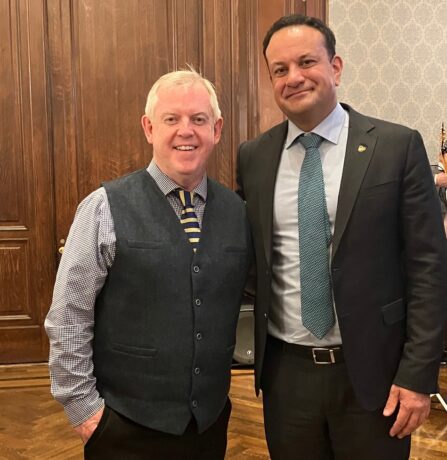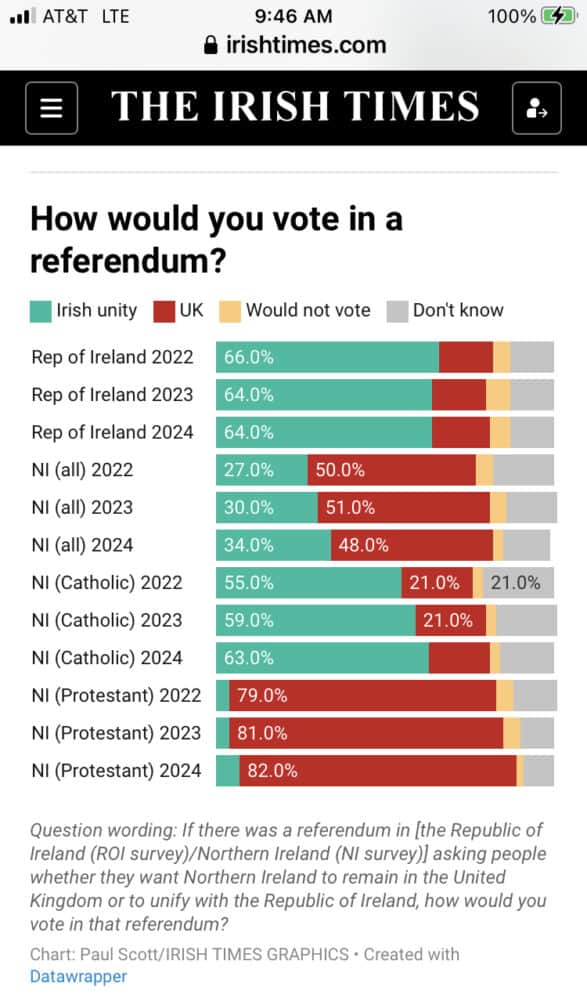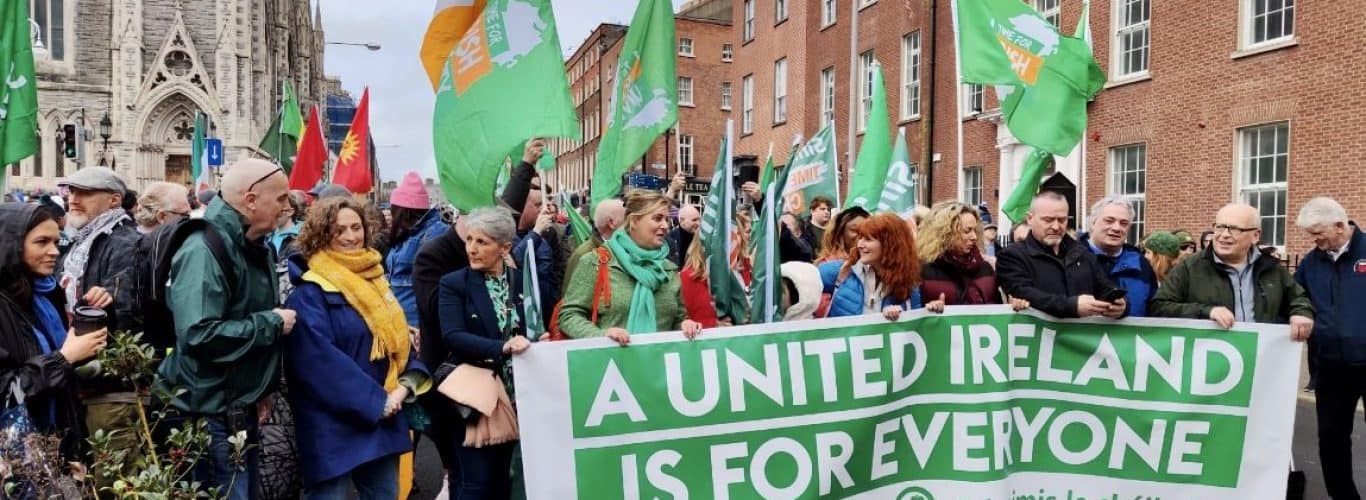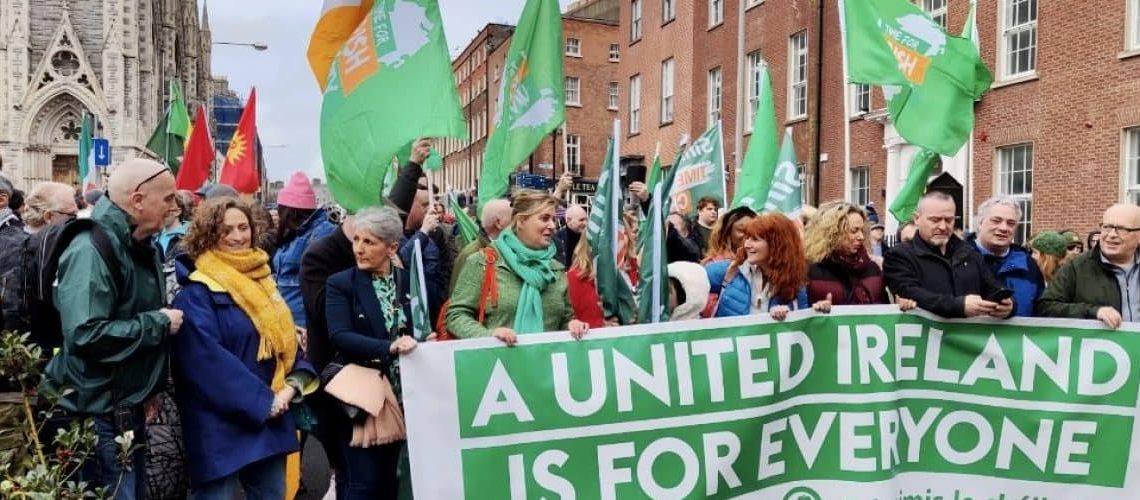The speech of Leo Varadkar to Irish-America in Philadelphia, Thursday 10th April, 2025
A chairde. Táim lán le hathas beith an seo i mBaile Grá Dreatharach inniú agus táim buíoch don dheis leabhart libh anocht.
Dear Friends. Tonight, we gather as friends of Ireland – and as dreamers and architects of its future.
Here in the city of brotherly love – where a new nation declared itself free – we are reminded that history can be made by courageous and spirited people who choose hope over fear and find new ways of moving past seemingly insurmountable obstacles.

-
Save
This is my first time in this great city and I am honoured to be here.
First of all, my thanks to Ireland’s Future for organising this evening’s event.
Every generation has its great cause. I believe ours is the cause of uniting our island, working to embrace differences instead of trying to erase them. Working to build a new home where all traditions, all stories, and all our people belong. I believe building a new Ireland, a united Ireland is the political project of our generation. It belongs to no one person, no one party, no one community, and no one Government. It belongs to all of us who believe in it. As is always the case, the impetus for great change must come from the grassroots. Ireland’s Future provides a cross-party cross-community platform for people to come together. So, thank you!
My thanks also, to all of you for attending and for your love for Ireland. Since Irish people started arriving on these shores, Ireland has been part of the story of America. And America has been part of the story of Ireland. When Pearse proclaimed the Irish Republic in front of the GPO in Dublin in 1916, he spoke about how Ireland was ‘supported by our exiled children in America’.
When the War of Independence was raging, President De Valera travelled here to seek political and financial support, speaking to massive gatherings in Madison Square Garden and Carnegie Hall in New York, fifty thousand people in Fenway Park in Boston, crowds in San Francisco, in Chicago and in Los Angeles and in Pittsburgh and here in Philadelphia. He raised $5m in bonds for the ‘American Commission on Independence’ and raised awareness of Ireland’s case for independence.
In the same way the exiled children of Ireland once built a new life here, so too can we build a new Ireland at home. A new home founded on our shared hopes, our shared responsibilities, and our shared pride in our diverse identities and traditions.
During the Troubles, one of my personal heroes, Denis Mulcahy, showed the difference one person can make. Denis, originally from Cork, became a bomb disposal expert and police officer in New York. He focused on reconciliation establishing Project Children which brought Catholic and Protestant children to America for the summer to experience peace and get to know each other away from the violence. It broke down barriers. The Washington Ireland Programme which emerged from it brought me to America for the first time twenty-five years ago to intern in Congress, one of a group of students from both North and South. Bill Clinton, as President, played a crucial role in creating the right political environment in which the Good Friday Agreement was made. London does not always pay attention to what’s happening in Ireland, North or South. But they always pay attention to the White House. This is something I learned when negotiating Brexit and I am profoundly grateful for the help we got a difficult moments from President Biden, a son of Pennsylvania.
The Good Friday Agreement has given us peace on our island, power-sharing and devolved government in Northern Ireland involving both Protestants and Catholics and closer co-operation between North and South and between Ireland and Britain. It also provides for a democratic mechanism by which Ireland can be united once a majority on both sides of the border want it. The British and Irish Governments are the co-guarantors of the Agreement and in many ways, America is the third guarantor.
And so, twenty-five years later, we ask for your support again.
Michael Collins, in signing the Anglo-Irish Treaty was clear. The Treaty, he said, ‘does not give us the ultimate freedom – not the freedom that all nations desire and develop to – but the freedom to achieve it’. He was right. It was a ‘stepping stone’. In the years that followed, the Treaty ports were returned, full sovereignty secured, a new Constitution adopted and a Republic established. Through membership of the European Union, Ireland secured its economic independence and security taking its place among the nations of Europe. Through the Good Friday Agreement, we have a settlement on how Northern Ireland should be governed and how unification might be achieved by democratic means. All stepping stones.
I firmly believe that building a new and united Ireland is the next step in our national journey and I believe that Irish-America can help us to make those next steps. While there is not yet a majority for it North of the border, support grows with every year and unification now is supported by a clear majority of younger voters. The tectonic plates are shifting and in one direction only.

-
Save
Unification, however, is not inevitable. The case has to made and it has to be worked for. It should be an ‘objective’ not just an ‘aspiration’. I have always argued against a border poll in the short term. But we should prepare for one. The Good Friday Agreement is clear that it should only happen when there is a majority for it north of the border. It is evident we are not there yet. A border poll defeated, would be divisive and could reverse momentum setting us back a generation. Australians rejected a republic in 1999 because they were offered the wrong model. No
Government has risked asking the question against since even though many were led by republican Prime Ministers. In Scotland, which rejected independence in a referendum ten years ago, a second referendum seems far off. Nearer to here, Quebec, rejected sovereignty by a whisker. The lessons are clear. Don’t do it until you are confident you can win it and make sure you have answers to all of the hard questions even if they are imperfect ones.
We should prepare.
In particular, we need to think about how a new and united Ireland would be governed, how we could merge our economies, our health services, education systems, judicial systems, policing and defence. It should not be the annexation of the North by the South but a new Ireland co-designed, as much as is practicable, by everyone who calls Ireland home. Crucial to building a majority for unification and ensuring it is a success will be
securing the place and protection of minorities on the island, in particular, the million people who identify as British, and should be accepted as such. A new and united Ireland must be a warm house for them and for all us – those of us who are Irish, those of us who are British and those of us who identify as both. There are many ways that this can be done. But that is for another night.
As you know, the Good Friday Agreement does not require that reconciliation between the two main communities should occur before a border poll takes place and I am sure there would not have been a Good Friday Agreement had this pre-condition been set. I think making it a pre-condition would be a mistake. It
could encourage some to eschew reconciliation so that they do not have to contemplate unification. However, I firmly believe that reconciliation, unity among people, is deeply desirable and is the ultimate prize. But I believe it can be worked towards and achieved as quickly in a United Ireland as has been the case in the United Kingdom. Northern Ireland is at peace but it remains a divided place with two major communities who often attend different churches, different schools, read different newspapers and play different sports. I believe this is changing and I believe community development, addressing legacy and, above all,
integrated education can accelerate that change and become the key to breaking down boundaries. For those of you involved in philanthropy and giving, I ask you to consider this priority, and I know many of you do in your support for the Ireland Funds and other charities.
I believe there is a strong economic case for unification. But even if there was not, I would still support it. The aspiration is about people never about money. It is not to ‘fumble in the greasy till add the half pence to the pence’, to quote Yeats, but do imagine a world that is ‘changed utterly’.
Nonetheless, I don’t agree that Northern Ireland will be a financial burden for long. I believe the North’s economy would grow faster as part of a new and united Ireland back in the European Union. Corporate profit taxes would fall for Northern Ireland’s business making them more competitive and attracting
more investment into the province. Pensions, welfare payments and public sector salaries would overtime, be equalised upwards, to match those in the Republic. The north-east of Ireland was once it’s economic and industrial powerhouse. It could be again.
Through the Shared Island Fund, the last Government which I led and the new one elected this year, has committed €2bn to cross- border projects including new roads, bridges, tourist and sporting infrastructure and educational projects that benefit the island as whole. The Government is already putting its money where its mouth is. I believe we should do more. We have a budget surplus much of which we are setting aside in a Future Ireland Fund to cover costs we know will arise due to our aging population, like pensions and senior care and climate action. We should set some aside, as well, to help pay for transition to a new
and united Ireland when it comes.
In politics, when things change they can change very quickly. It happened when the Berlin Wall fell resulting in a chain of events which brought down the Soviet Union. Indeed, it’s happened in the 80 days since President Trump took office and shook up decades of established alliances and trading relationships.
President Ronald Reagan reminded us that ‘America is too great for small dreams’. In Ireland, we have had enough of small dreams. We want to think big, act boldly, and shape an Ireland that matches the dreams and aspirations of our history and our people.
There are decades where nothing happens and there are weeks when decades happen. We should be prepared and I believe people want us to be. I would like to see a Forum established, on lines of the New Ireland Forum established by one of my forebears Garrett FitzGerald or the Forum for Peace and Reconcilation established by Albert Reynolds. A Forum could engage groups, political representative and civil society, who are willing to engage on these issues – issues like reconciliation, legacy and healing, issues like the reform of the existing institutions of the Good Friday Agreement to make them more sustainable, more democratic and to ensure they function better and issue like the future constitutional structure of a new Ireland. I do not think it is a radical idea. I do think it makes sense to plan. And above all, to talk and engage.
Once again, thank you for being here. Thank you for your interest and for your support.
Allow me to end with the word of Charles Stewart Parnell, a great leader once called the uncrowned king of Ireland – words etched into the base of the monument to him in Dublin’s Parnell Square: ‘No man has a right to fix the boundary of the march of a nation, no man has a right to say to his country – thus far shalt though go and no further.’
Let us be the generation that refuses to accept the limits of the past. Let us join together to build an Ireland worthy of all who love and believe in it and who call it home. Let us begin tonight.
Ar aghaidh linn le cheile

-
Save


